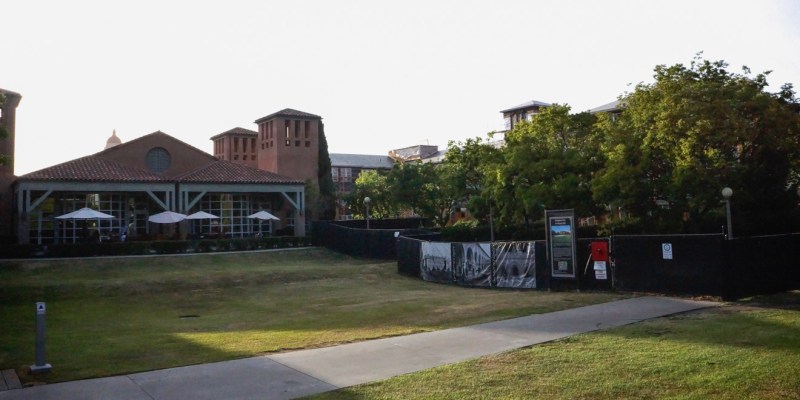An electrical failure at Humanities House activated a fire alarm, forced a temporary student evacuation and elicited a response from the Palo Alto Fire Department on Feb. 16. Although no property was damaged, it was the latest in a series of problems in the new building that have frustrated and, on occasion, displaced residents.
“The cause of the alarm was identified as work being done on an electrical panel that caused a short and some smoke but no fire,” said Rodger Whitney, executive director of R&DE Student Housing and Community Housing, in an email to The Daily.
After the alarm sounded at 9:20 a.m., the fire department arrived in less than three minutes, Whitney said.
“We stopped hearing the alarm after about 40 minutes, but we didn’t get back into the dorm until at least 20 minutes afterward,” said Justin Hsuan ’18, a Humanities House resident.
Hsuan said that the incident may have inconvenienced some residents who had morning classes if they had backpacks or other class materials inside during the fire department’s investigation. Personally, he said, the time outside interrupted his sleep schedule.
“I was sleeping and then it woke me up,” he said. “As soon as we got back in the dorm, I went right back to sleep … I didn’t wake up until, like, 1:30 p.m. that day.”
Truman Chen ’17, a residential assistant (RA) at Humanities House, found a silver lining to the situation.
“Not sure there was much of an impact other than inconvenience in the early morning,” Chen said. “Plus side: Residents gathered outside and bonded in their collective suffering!”
Chen also said that the short led to a power outage for about an hour and a half after residents were allowed back inside the building.
While the mishap was handled smoothly, Chen said that he and the other RAs were not completely certain of the process for dealing with fire alarms. For example, they did a roll call but realized afterwards that that was not necessary.
“It would have been nice to have had a drill beforehand,” he said. On the other hand, Chen added that they now feel more prepared for emergencies in the future.
Whitney confirmed that there are no outstanding functional issues with the Humanities House residence and that no property was damaged in the incident. However, two noise-related issues arose this year, one of which will lead to the reassignment of residents in spring quarter.
“With any new building, issues may arise after residents have moved in, especially when systems are used for the first time,” Whitney said.
One of the noise complaints came from the hydronic heating system, which circulates hot water through convectors mounted in each room.
“Some people experienced a chattering or knocking noise,” he said. “The heating valves have been adjusted to prevent this noise from reoccurring.”
The other noise issue stemmed from a problem with the amount of noise transfer through the wood frame construction of the house, particularly in rooms on the third floor above the resident fellow’s (RF) apartment. Residential Education (ResEd) worked with students to implement several attempted fixes throughout fall and winter quarter, according to Harry Elliott ’18, a resident living on the third floor of Humanities House.
“We have had to go through multiple rounds of fixes, from fancy bath mats to a renovation that required us to move all our stuff out to a plea to walk around quietly,” he said.
Elliott and at least four other students were informed by ResEd on Monday that they would be forced to change rooms because of the noise issue. Elliott said he was appalled at the way ResEd and R&DE Student Housing were handling the situation.
“I really do hope the noise on the second floor is absolutely intolerable to tolerate this level of displacement,” he said.
Elliott also expressed concern that affected residents were given only one day to respond to ResEd with their housing preferences related to the move.
ResEd has offered students movers to help them make the transition, according to an email from Koren Bakkegard, associate dean of ResEd.
“We deeply regret the necessity of an additional disruption to your housing assignment this year,” Bakkegard wrote in the email. “We know this has not been an easy process for you, and were it not for the significant impact on the health and wellbeing of the RF family, we would not need to take these rooms offline for occupancy.”
Contact Tristan Vanech at tvanech ‘at’ stanford.edu.
